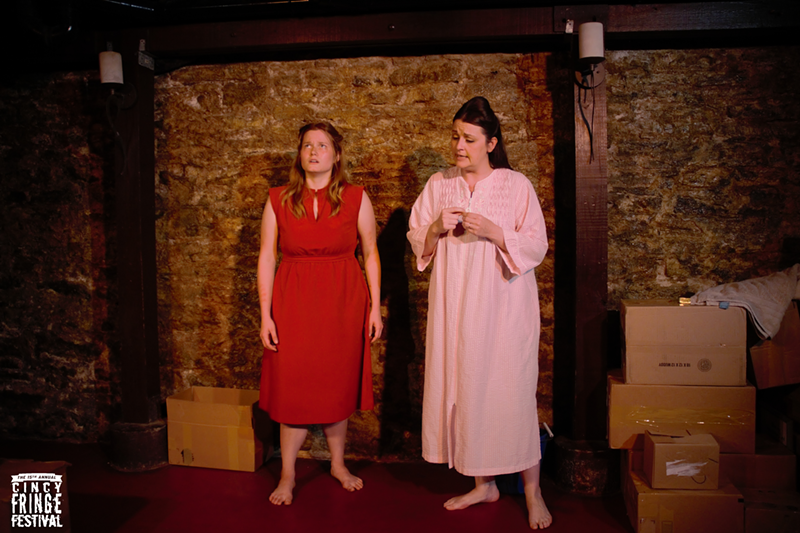The stage is already brightly lit when the audience enters the space for the Cincy Fringe Festival performance of All We Have Borne, a dramatic play written by Victoria Hawley, a Cincinnati-based theater artist. What makes this light so jarring isn’t the smallness of the space, nor the true basement setting beneath MOTR Pub. What first strikes everyone filtering into the space is a young woman onstage, badly beaten and restrained.
She is Laura Wood, a 20-year-old college student who has held against her will in the basement of a home somewhere in the rural South. Laura, played by playwright Victoria Hawley, is not alone in her captivity however. She soon meets the woman of the house, played by Lauren Carr, a captive herself, quite different from Laura.
As the play progresses, the women move through the stages of grief as the audience looks on with hearts and stomachs twisted into knots. Laura’s grief stems from her captivity and fear of impending death, while the woman’s grief is rooted in a lifetime of abuse and desperate longing for the baby that Laura is discovered to be carrying due to her captor’s abuse.
Nothing is black and white in All We Have Borne. The women eventually form a genuine companionship, but that can only go so deep. The inherent lack of trust between them adds a layer of constant suspense. Neither woman knows if she can trust the other to gain what they desire — escape for Laura, a child for the woman. This intricacy trickles out into those in attendance, hanging on the edge of their seats, hoping for the best and dreading the worst.
The woman of the house is never given a name; in the program she’s merely called “Woman.” She is both victim and purveyor of domestic and sexual violence, so it’s a powerful statement for her to be nameless. Her own identity, it seems, has been taken from her. She has morphed into a dangerous co-dependency with her abusive husband, a relationship that makes breaking free nearly impossible.
So beaten down and broken by a lifetime of abuse, it is in the woman’s sincere earnestness and naiveté of the possibility of a better life that she forms a connection with and draws sympathy from the audience. Even as she goes to great lengths to justify her involuntary companion’s captivity, her escape is just as important as Laura’s.
All We Have Borne raises difficult questions regarding morals in the face of the seemingly impossible. But ultimately this is a story about women supporting each other and taking back their lives.
A portion of the proceeds from All We Have Borne go to Women Helping Women, a Cincinnati organization dedicated to crisis intervention, prevention and advocacy for survivors of gender-based violence. Fringegoers are invited to text “Fringe2018” to 41444 to make a donation.
The Cincinnati Fringe Festival runs through June 10. Find showtimes, tickets and more info here.






